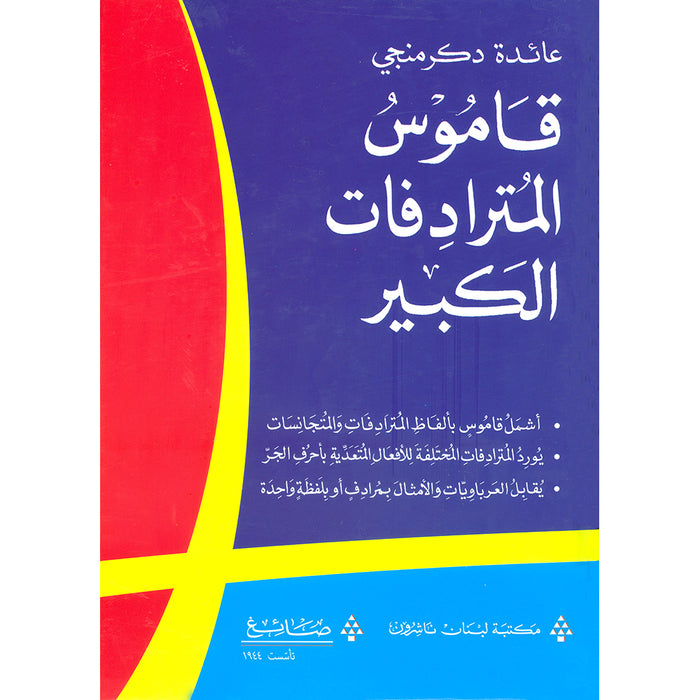Prior to creating this dictionary, I researched other dictionaries and their handling of synonyms. Prior to creating this dictionary, I researched other dictionaries and their handling of synonyms. What I realized is that most of what has been published is linguistic composition. In other cases, they were dictionaries of words’ meanings according to their subjects or alphabetical dictionaries that follow synonyms with randomly-mixed entries. This doesn't allow the student to grasp the information, resulting in the misunderstanding and misuse of words.
The Second Root Theory, found in Ahmed Fares Al Shidyaq's dictionary The Secret of Nights in the Heart and Replacement, states that the origin of Arabic words comes from trades.
From each origin or its antonym, other subjects branch, but they all share the same meaning, which is that of their origin.
Ahmad Al Shidyaq also believes that each subject can have several original meanings and not just one. He used an Arabic word with two original meanings as an example.
Although I count both of these theories as logical laws in looking for synonyms, I wanted to find other words that are synonyms but are very different in their origins. This is because the Arabic language has plenty of synonyms, each with a different origin, and the sense of choosing the right word has a major role in making a dictionary.
Moreover, a researcher might come across a verb preceded by a preposition, which changes the verb's meaning and may even reverse the meaning. Plus, the meaning of a three-letter verb would change when adding an extra letter to it, and all of this adds to the linguistic resources of synonyms, increasing the knowledge a research student would benefit from.
The door of composition has opened new prospects, as every strong phrase, heartfelt word, or common example can be an expression. Placing a synonym or a word that comes from its origin would be enough to show how our language has developed and changed. Otherwise, it would have become extinct.
What I realized is that most of what has been published is linguistic composition. In other cases, they were dictionaries of words’ meanings according to their subjects or alphabetical dictionaries that follow synonyms with randomly-mixed entries. This doesn't allow the student to grasp the information, resulting in the misunderstanding and misuse of words.
The Second Root Theory, found in Ahmed Fares Al Shidyaq's dictionary The Secret of Nights in the Heart and Replacement, states that the origin of Arabic words comes from trades.
From each origin or its antonym, other subjects branch, but they all share the same meaning, which is that of their origin.
Ahmad Al Shidyaq also believes that each subject can have several original meanings and not just one. He used an Arabic word with two original meanings as an example.
Although I count both of these theories as logical laws in looking for synonyms, I wanted to find other words that are synonyms but are very different in their origins. This is because the Arabic language has plenty of synonyms, each with a different origin, and the sense of choosing the right word has a major role in making a dictionary.
Moreover, a researcher might come across a verb preceded by a preposition, which changes the verb's meaning and may even reverse the meaning. Plus, the meaning of a three-letter verb would change when adding an extra letter to it, and all of this adds to the linguistic resources of synonyms, increasing the knowledge a research student would benefit from.
The door of composition has opened new prospects, as every strong phrase, heartfelt word, or common example can be an expression. Placing a synonym or a word that comes from its origin would be enough to show how our language has developed and changed. Otherwise, it would have become extinct.
- سَبَقَتِ الخطوة الأساسية في وضع هذا القاموس، خطوات جدّية في البحث عمّا صدر من معاجم في هذا الشأن، وكيفيّة تناولها للمترادفات. واتّضح لي، بعد مراجعةٍ وتدقيق، أنَّ جلَّ ما نُشر يكون إما باباً من أبواب مؤلّفٍ لغويّ، أو معاجم لمعاني الألفاظ حسب موضوعاتها، أو معاجم ألفبائيّة تتابع مترادفات مداخلها مختلطة بطريقةة عشوائية، لا تُمكّن الطالب من الاحاطة بدقائقها، فيُسيء فهمها ولا يُحسن استعمالها في الموقع المراد.
- تقولُ نظريّة الجذر الثنائي التي وضعها أحمد فارس الشدياق في معجمه " سرّ الّليال في القلب والإبدال" إنّ أصل الكلمات في العربيّة حرفات، وتتفرّعُ عم كلّ أصلٍ، أو مقلوبِه، موادٌّ أخرى، لكنّها تشتركُ جميعُها في معنًى واحدٍ عام، هو ما يعتبرُ أصل تلك المواد كلّها.
- وقبلَ الشَِدياق، يرى ابن فارس أنّ المادة الواحدة قد تحملُ معنَيَيْن أصليَّين لا معنًى واحداً، وقد يكون لها أكثر من ذلك، فالّلفظُ " جبر" مثلاً، له معنيان أصليّان، أحدهما ضد " الكسر " والثاني بمعنى " الاجبار" على الشيء، وهو يرجعُ الى معنى " جبَّ" أي غلب.
- وبرغم اعتمادي هاتين النظريتين بمثابة قاعدة بديهية في البحث عن المترادفات، إلا أنّي تجاوزتهما بإيراد متجانسات أخرى تختلف أصولها اختلافاً شاسعاً في ما بينها، فاللغة العربية تحفلُ بألفاظٍ تدلُّ على أكثر من معنى، ولكلٍّ منها ما يزيدُ على مرادف واحد من غير اصله، والحسُّ السليم في الانتقاء يؤدي دوراً هامّاً في عملية بناء المعجم.
- إضافةً الى ما سبقَ، تواجهُ الباحث في ميدان المترادفات أفعالٌ تتعدّى بأحرف الجرّ، فيختلف معناها، أو ينقلبُ نقيضاً لمعناها الأساسيّ. وكما أنّ معنى الفعل الثلاثي يتبدل إذا زيد عليه حرف من حروف الزيادة، كذلك يتغيّر معناه بتغيّر حرف التعدية، وهذه ثروةٌ لغويّة تُضافُ الى حقلِ المترادفات، فتُعطيه بعداً شاملاً، يُسهمُ في تعزيز مكتسباتٍ يسعى اليها الطالب الباحث.
- ويُشرِّعُ بابُ التعابير والعرباويّات آفاقاً جديدة، فكلُّ عبارةٍ متينةٍ أو قولٍ مأثورٍ أو مثل سائرٍ، قد يكون بحدّ ذاته تعبيراً، فجعلتُ الى جانبه مرادفاً أو لفظةً واحدةً، تفي بمضمونه استناداً الى المفهوم السابق له، وكيفيّة تطوّر معناه في زمننا الحاضر، فكلُّ لغةٍ لا تتطوّر وترتقي، يكون مصيرها الانقراض.
















